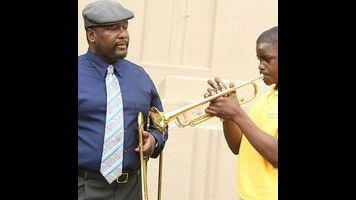Treme: "Feels Like Rain"

Treme usually takes a rigidly democratic approach to its storylines, so when the focus shifts, even slightly, to one character’s story it can feel dramatic. Though it’s Annie who has a revelatory moment listening to the John Hiatt song that gives the episode it’s title, it’s Toni who bookends “Feels Like Rain.” We see her first preparing to join Sofia and the late Creighton for a Mardi Gras parade in the dream sequence that opens the episode and leave her marching in a real-life celebration, the Pigeon Town Steppers’ previously endangered second line. I didn’t take a stopwatch to the episode, but it at least feels like we spend more time with Toni than other characters this week, watching her worry about Sofia, continue to talk to Terry both about police business and just because the two like each other (a little more each week, it seems), revisit the increasingly intriguing cold case she passed on to a legal clinic, and receiving a bit of praise from Oliver Thomas: “That’s what I admire about you, Toni, your faith in the system, despite all your experiences to the contrary.”
It’s an honest, if loaded, compliment, and one Toni accepts with pride. The system can work, she seems to think, if enough people make it work. That requires bullish strength and a pit-bull tenacity, both of which Toni possesses in abundance. Consider the past few years, which included Katrina, her husband’s suicide, and her city’s descent into chaos both in the street and in the systems meant to keep everything running. And yet, there she is, doing what she does, working on the side of the angels. It’s not her episode by any means, but “Feels Like Rain” gives viewers ample time to contemplate who Toni is and how she works.
And, for that matter, whether or not she’s right. Last week she fought for the right of the Pigeon Town Steppers to parade without paying an outrageous fee for the privilege. This week, the Pigeon Town Steppers get what they want—and celebrate in high style—but not because Toni’s out there fighting the good fight for them. Instead, they’re out there because Nelson donates money as a show of good faith for Thomas, a gesture tied up in a series of back-room deals between Nelson, Ligouri, and forces unknown for still-unclear purposes. “I'm starting to figure this place out,” Nelson tells the woman with whom he’s currently spending time. “It's a village. A village on an island.” He could add that the village is run by a complicated, and often sleazy, barter system of exchanged favors and averted gazes. And yet that same system gives everyone the moment that ends the episode, one that unites Nelson, Terry, Tony, Thomas, Sofia, and the Pigeon Town-ers in a joyous, community-uniting celebration. Even though it took some wrong to make it happen, but something went right.
It’s also a moment that almost certainly couldn’t have happened anywhere else. Even more than the first season, this second season of Treme has stressed the elements that make New Orleans uniquely New Orleans, and the question of whether or not those elements will survive. It’s not a given. Antoine plays his students the jaw-dropping opening of Louis Armstrong’s “West End Blues” and meets with yawns from some and bravado from one kid who boasts about being able to play the same thing, if he had the notes. He fails to grasp that it’s not about knowing the notes, it’s about knowing how to summon the notes from nothingness. Does the kid get it? The question remains unanswered.
Whether Albert will resume his Big Chief duties remains up in the air, too, though the signs have started to point to yes. After a brief stop in Houston, he spends some time with Del in New York and seems energized by his new surroundings, even if he can’t refrain from mocking the city, with its cramped apartment and newfangled bead stores that have everything except the one thing you need. But he seems genuinely touched by Del’s beadwork tribute to his father, and how could he not be? The moment provided one of the best scenes in a good but uncharacteristically uneven episode.
The focus on Toni worked well, but it also means other characters got shorted for time. Specifically Sonny, who gets unceremoniously dropped from Antoine’s band, though we never get to see his side of the story. (True, it’s not hard to figure out what that side will look like, and I don’t really object to less Sonny time, but still.) But it was other aspects of the episode that fell flat for me. I like Annie, but this season has shown how much of the character belongs to Lucia Micarelli’s fragile, soulful performance and how little to do with how she’s written. More time with Steve Earle’s Harley is always welcome, but I’m not really buying the scenes of Annie’s education as a songwriter. Not that her character would necessarily be familiar with the John Hiatt songbook, but her reaction to “Feels Like Rain” paints her as more naïve than any adult with a lifetime of musical experience ought to sound.








































